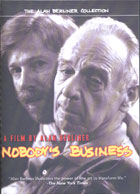
The Alan Berliner Collection: The Family Album (1986); Intimate Stranger (1991); Nobody’s Business (1996); The Sweetest Sound: A Film About Names (2001) 1986-2001
Distributed by Kino International, 333 W. 39th St., Ste. 503, New York, NY 10018; (800) 562-3330
Produced by Alan Berliner
Directed by Alan Berliner
DVD, color and b&w, 60 min. each film
Jr. High - Adult
Family Histories, Genealogy, Immigration, Experimental Film, Film Studies
Date Entered: 10/21/2010
Reviewed by Christopher Lewis, American University Library, American UniversityAlan Berliner is a crossover filmmaker. He’s a documentarian who uses experimental techniques. His work is polished and hip though his subjects are rooted in the images and stories of mid-twentieth century America and earlier. This re-released set of his first four major films collectively captures the vicissitudes of life on which family histories are built. Each of the films in this series, released between 1986 and 2001, address issues of one’s identity within the context of a family. Berliner is probably the filmmaker who comes closest to perfecting the home movie. His carefully researched and constructed narratives vividly recreate family dynamics in such gripping detail that one can’t help but identify with themes and stories that are common in many Americans lives.
Apart from his own family’s history, Berliner is an inveterate collector of the artifacts of other families’ histories, namely home movies and audio recordings, and he incorporates these liberally in his films. With the exception of Family Album, he narrates everything and usually in the voice of someone who’s trying to understand something he can’t quite unlock (his maternal grandfather’s private life, his father’s utter lack of sentimentality, the connection between one’s name and his being). His use of sound effects (boxing ring bells, metronome clicks, simple piano notes) as transitions is also a signature technique.
Of the four films, The Family Album (1986) stands apart because it’s not directly about Berliner or his uncovering of his family’s history. It’s an experimental piece constructed almost entirely of unknown people’s home movies and recordings. From his vast library of found histories, he stitched together a captivating montage of film clips arranged by stages of a life from birth to death and the start of a new cycle. The images are accompanied with recordings of all manner of voices and accents none directly associated with the visuals but matching in tone. The footage is all vintage from 8mm and 16mm sources. Because of its stop and start pace and scores of jumps from story to story, it works less as a narrative than as a visual poem. It’s an entertaining piece but at a 60-minute running time a little long.
Intimate Stranger (1991) is Berliner’s investigation of the life of his maternal grandfather, Joseph Cassuto, a man who lived most of his adult life apart from his family working as a buying agent for a Japanese textile manufacturer. Through his style of assembling vintage images and film clips, and his narration and personal accounts of Cassuto’s children, Berliner breathes life into a man who many would view as unremarkable. To his family Cassuto was inscrutable and distant but to his Japanese employers and friends he was a devoted and deeply caring person. The portrait Berliner assays is of a man born in the wrong place. Cassuto’s embrace of Japanese culture and people at the expense of his own family and background is confounding to the filmmaker who at turns marvels at his grandfather’s career and indulges his family’s bitterness toward their absentee father. With this film Berliner demonstrates how a close study of what seems ordinary can reveal something extraordinary and universal.
In Nobody’s Business (1996), Berliner finds a subject the viewer won’t be able to resist, his father, Oscar Berliner. Berliner the elder is one of the most irascible subjects ever captured in a documentary. He’s a man whose reclusiveness and exceeding unsentimentality will probably have the viewer laughing out loud at moments and maybe admiring for his utter lack of pretention. As the son probes the father’s past, the elder Berliner’s annoyance with the whole process is gradually peeled back to reveal the deep devotion he has to his children, his fears and regrets, and his reasons for resigning from an active life. The filmmaker’s interviewing of his father is symbolized with cutaways to an old time boxing match. At each turn his relentless questions about his father’s successes in earlier life or relationship with his parents and others are met with dismissive retorts. As the film unfolds he eventually starts to soften and gradually opens up. It’s a very cathartic film for filmmaker and subject and unique as a character study.
In The Sweetest Sound (2001), Alan Berliner spends an hour considering the relationship he has with his name. He seeks out and communes with all other Alan Berliners he can locate and is disappointed to find little in common among them except that their mostly white, middle-aged, and Jewish. He delves into the origin of both his given and surnames. He mulls ethnic dimensions of certain names and how a name’s spelling variants can affect other’s opinions. He finds those who desire unique names and still others that celebrate sharing their names. He takes pride in other Alans who have become famous. His pursuit of the origin of the name Berliner is much more complex than it would seem. He uncovers wildly conflicting stories and most not leading back to Berlin. After extensive research he also dispels the myth that immigrants with difficult to spell or pronounce names were arbitrarily renamed at Ellis Island. He also attends to how that myth may have come about it. In the end this is a very entertaining finale to this collection of a gifted filmmaker’s work.
In summary, Nobody’s Business is the one title that’s essential for academic and public library collections. The other three are recommended for public libraries and academic libraries with sociology, American studies, or Jewish studies programs.